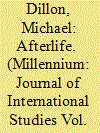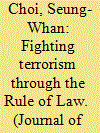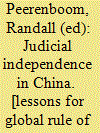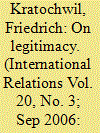|
|
|
Sort Order |
|
|
|
Items / Page
|
|
|
|
|
|
|
| Srl | Item |
| 1 |
ID:
124622


|
|
|
|
|
| Publication |
2013.
|
| Summary/Abstract |
This article provides a prolegomena to a discussion of what Michel Foucault meant by 'political spirituality' and 'the courage of truth (parrhesia)', terms which preoccupied his last lectures at the Collège de France and through which he continued to pursue his lifelong concern with the politics of truth and the history of the present. The article approaches these issues through the fate of the three strategic figures - God, Man and Life - that have traditionally problematised western rules of truth and truths of rule. It then proceeds to explore the living death, or afterlife, of Man and Life, which calls for a new courage of truth, and to which 'political spirituality' has been one response.
|
|
|
|
|
|
|
|
|
|
|
|
|
|
|
|
| 2 |
ID:
101685


|
|
|
|
|
| Publication |
2010.
|
| Summary/Abstract |
The question of whether democratic institutions facilitate terrorist activities is a controversial one in current scientific studies of terrorism. Although the ''rule of law'' is an essential institutional pillar of any mature democracy, its direct effect on domestic and international terrorism remains unexplored. Conceiving democratic rule of law as the coexistence of effective and impartial judicial systems and citizens' recognition of the law as legitimate, the author presents a causal explanation in which a high-quality rule of law is considered to dampen ordinary citizens' opportunity and willingness to engage in political violence, protecting democracies from becoming victims of terrorism. Built on a cross-sectional, time-series data analysis of 131 countries during the period from 1984 to 2004, the author finds that, ceteris paribus, maintaining a sound rule of law notably reduces the likelihood of any type of terrorist events. In short, the rule of law instantiated in democratic institutions provides a formidable bulwark against terrorism.
|
|
|
|
|
|
|
|
|
|
|
|
|
|
|
|
| 3 |
ID:
084536


|
|
|
| 4 |
ID:
098307


|
|
|
|
|
| Publication |
Cambridge, Cambridge University Press, 2010.
|
| Description |
x, 620p.
|
| Standard Number |
9780521137348
|
|
|
|
|
|
|
|
|
|
|
|
Copies: C:1/I:0,R:0,Q:0
Circulation
| Accession# | Call# | Current Location | Status | Policy | Location |
| 055186 | 347.51/PEE 055186 | Main | On Shelf | General | |
|
|
|
|
| 5 |
ID:
073985


|
|
|
|
|
| Publication |
2006.
|
| Summary/Abstract |
This article provides a conceptual analysis of different uses of the term 'legitimacy'. Rather than attempting to provide a simple 'definition' I argue that the meaning of the concept cannot be understood in terms of a clear reference, but has to be analysed through its links with other concepts within a semantic field. In this way we are also able to 'explain' why at first contradictory uses of the term (designating its 'input' or the 'output' side) are part of its 'grammar'. To that extent attempts at stipulative definitions aiming at an unequivocal sense of the term fundamentally misunderstand the function of this concept within the political discourse.
|
|
|
|
|
|
|
|
|
|
|
|
|
|
|
|
| 6 |
ID:
108203


|
|
|
|
|
| Publication |
London, Pluto Press, 2003.
|
| Description |
219p.
|
| Standard Number |
97874531379
|
|
|
|
|
|
|
|
|
|
|
|
Copies: C:1/I:0,R:0,Q:0
Circulation
| Accession# | Call# | Current Location | Status | Policy | Location |
| 056341 | 303.625/CHO 056341 | Main | On Shelf | General | |
|
|
|
|
| 7 |
ID:
106043


|
|
|
|
|
| Publication |
2011.
|
| Summary/Abstract |
In International Relations, the question of global governance has become a main issue that has given rise to numerous research programs and products on the question of how to govern. IR scholarship, however, has more or less been conducted according to the tradition of regime and institution studies, focusing on how rules govern and how institutions can promote cooperation by lowering transactional costs and reduce conflict by increasing predictability and decreasing uncertainty. 1 In the IR discourse, rule-based governance seems to be the only model at international, regional, and global levels.
|
|
|
|
|
|
|
|
|
|
|
|
|
|
|
|
| 8 |
ID:
084475


|
|
|
|
|
| Publication |
2008.
|
| Summary/Abstract |
Since Nigeria's transition from military to civilian rule in 1999, the country's Supreme Court has risen from a position of relative political obscurity and institutional vulnerability into a prominent and independent adjudicator of inter-governmental disputes in this chronically conflicted federation. Examined here is the Court's arbitration, during President Olusegun Obasanjo's two civilian constitutional terms (1999-2007), of fifteen different federal-state litigations over offshore oil resources, revenue allocation, local governance and public order. The Court's federalism decisions were remarkably independent and reasonably balanced, upholding the constitutional supremacy of the Federal Government in several findings, tilting towards the states in some declarations, and simultaneously underwriting federal authority and state autonomy in other rulings. Despite the Court's important and independent role, however, the Nigerian federation was vexed by violent conflicts, underscoring the structural, political and constitutional constraints on judicial federalism in this notoriously complex and divided country.
|
|
|
|
|
|
|
|
|
|
|
|
|
|
|
|
|
|
|
|
|